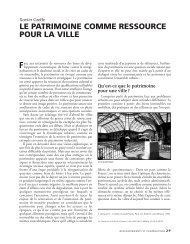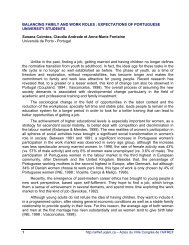Developing peer support worker roles: reflecting on ... - Emerald
Developing peer support worker roles: reflecting on ... - Emerald
Developing peer support worker roles: reflecting on ... - Emerald
Create successful ePaper yourself
Turn your PDF publications into a flip-book with our unique Google optimized e-Paper software.
PEER SUPPORT<str<strong>on</strong>g>Developing</str<strong>on</strong>g> <str<strong>on</strong>g>peer</str<strong>on</strong>g> <str<strong>on</strong>g>support</str<strong>on</strong>g><str<strong>on</strong>g>worker</str<strong>on</strong>g> <str<strong>on</strong>g>roles</str<strong>on</strong>g>: <str<strong>on</strong>g>reflecting</str<strong>on</strong>g><strong>on</strong> experiences in ScotlandSim<strong>on</strong> BradstreetDirector, Scottish Recovery NetworkRebekah PrattDeputy Director, Scottish Primary Care Mental Health Research and Development Programme, University of EdinburghAbstractThis article describes the development of <str<strong>on</strong>g>peer</str<strong>on</strong>g> <str<strong>on</strong>g>support</str<strong>on</strong>g> <str<strong>on</strong>g>roles</str<strong>on</strong>g> and programmes in Scotland, and includesfindings from an evaluati<strong>on</strong> of a <str<strong>on</strong>g>peer</str<strong>on</strong>g> <str<strong>on</strong>g>support</str<strong>on</strong>g> <str<strong>on</strong>g>worker</str<strong>on</strong>g> pilot scheme. The evaluati<strong>on</strong> assessed the impact of thepilot <strong>on</strong> service users, <str<strong>on</strong>g>peer</str<strong>on</strong>g> <str<strong>on</strong>g>support</str<strong>on</strong>g> <str<strong>on</strong>g>worker</str<strong>on</strong>g>s and the wider service system, al<strong>on</strong>g with c<strong>on</strong>sidering the issuesinvolved in implementing <str<strong>on</strong>g>peer</str<strong>on</strong>g> <str<strong>on</strong>g>support</str<strong>on</strong>g> programmes.Key wordsPeer <str<strong>on</strong>g>support</str<strong>on</strong>g>; Mental health; Service users; ScotlandUnderstanding <str<strong>on</strong>g>peer</str<strong>on</strong>g> <str<strong>on</strong>g>support</str<strong>on</strong>g>‘The most help I got was from the other peoplein the ward who had g<strong>on</strong>e through similarexperiences... The nurses, they’re great butyou find, or I find ... the best people thathelped me were other people that had beenthrough psychosis, had some little pointers,were grounded, that’s the thing.’ (Brown &Kandirikirira, 2007)For many years, people using mental healthservices have described the importance of <str<strong>on</strong>g>support</str<strong>on</strong>g>from others using the same service. This type ofinformal <str<strong>on</strong>g>support</str<strong>on</strong>g> can offer ideas and knowledge notnecessarily gleaned from service providers. The ideaof harnessing this shared experience as <strong>on</strong>e meansof promoting and <str<strong>on</strong>g>support</str<strong>on</strong>g>ing recovery, throughthe development of specific <str<strong>on</strong>g>peer</str<strong>on</strong>g> <str<strong>on</strong>g>support</str<strong>on</strong>g> <str<strong>on</strong>g>worker</str<strong>on</strong>g><str<strong>on</strong>g>roles</str<strong>on</strong>g>, is now gaining prominence in Scotland, theUK and internati<strong>on</strong>ally. Since 2005, a programmeof development <str<strong>on</strong>g>support</str<strong>on</strong>g>ed by the Scottish RecoveryNetwork (www.scottishrecovery.net) has seen thecreati<strong>on</strong> of a number of <str<strong>on</strong>g>peer</str<strong>on</strong>g> <str<strong>on</strong>g>support</str<strong>on</strong>g> <str<strong>on</strong>g>worker</str<strong>on</strong>g> <str<strong>on</strong>g>roles</str<strong>on</strong>g> as<strong>on</strong>e part of a wider programme of work to promoteand <str<strong>on</strong>g>support</str<strong>on</strong>g> recovery.Peer <str<strong>on</strong>g>support</str<strong>on</strong>g> <str<strong>on</strong>g>worker</str<strong>on</strong>g>s are people with pers<strong>on</strong>alexperience of mental health issues and recovery, whoare trained, and then employed to work in <str<strong>on</strong>g>support</str<strong>on</strong>g>of others in recovery. They can operate in a varietyof settings, but in Scotland and the UK many areattached to community mental health teams or inpatientsettings, where they complement the skill set with thelived experience of mental health issues and recovery.Peer <str<strong>on</strong>g>support</str<strong>on</strong>g> <str<strong>on</strong>g>worker</str<strong>on</strong>g>s can be described as modellingrecovery within teams, offering a lived example of thepossibility of progressi<strong>on</strong> and growth – both for peopleusing their services and for other team members. Theywork in a way that embraces key recovery c<strong>on</strong>ceptssuch as focusing <strong>on</strong> strengths and hope. Of centralimportance is the <str<strong>on</strong>g>peer</str<strong>on</strong>g> <str<strong>on</strong>g>support</str<strong>on</strong>g> <str<strong>on</strong>g>worker</str<strong>on</strong>g>’s ability todevelop <str<strong>on</strong>g>support</str<strong>on</strong>g>ive relati<strong>on</strong>ships where the appropriate3610.5042/mhsi.2010.0443Mental Health and Social Inclusi<strong>on</strong> • Volume 14 Issue 3 • August 2010© Pier Professi<strong>on</strong>al Ltd
<str<strong>on</strong>g>Developing</str<strong>on</strong>g> <str<strong>on</strong>g>peer</str<strong>on</strong>g> <str<strong>on</strong>g>support</str<strong>on</strong>g> <str<strong>on</strong>g>worker</str<strong>on</strong>g> <str<strong>on</strong>g>roles</str<strong>on</strong>g>: <str<strong>on</strong>g>reflecting</str<strong>on</strong>g> <strong>on</strong> experiences in Scotlandsharing of experiences can engender trust and arecovery-<str<strong>on</strong>g>support</str<strong>on</strong>g>ing envir<strong>on</strong>ment. In the United Stateswhere <str<strong>on</strong>g>peer</str<strong>on</strong>g>-involved services have existed for sometime, leading commentator and trainer Shery Meadhas defined <str<strong>on</strong>g>peer</str<strong>on</strong>g>-<str<strong>on</strong>g>support</str<strong>on</strong>g> as a ‘system of giving andreceiving help founded <strong>on</strong> the key principles of respect,shared resp<strong>on</strong>sibility, and a mutual agreement of whatis helpful’ (Mead et al, 2001).As <str<strong>on</strong>g>peer</str<strong>on</strong>g> <str<strong>on</strong>g>support</str<strong>on</strong>g> services have developed,an increasing evidence base is describing theimpact and unique c<strong>on</strong>tributi<strong>on</strong> of <str<strong>on</strong>g>peer</str<strong>on</strong>g> <str<strong>on</strong>g>support</str<strong>on</strong>g><str<strong>on</strong>g>worker</str<strong>on</strong>g>s within service systems. A literature reviewcommissi<strong>on</strong>ed to inform the development of <str<strong>on</strong>g>peer</str<strong>on</strong>g><str<strong>on</strong>g>support</str<strong>on</strong>g> in Scotland identified a range of benefitsfor people using <str<strong>on</strong>g>peer</str<strong>on</strong>g> <str<strong>on</strong>g>support</str<strong>on</strong>g> services, includingreduced time spent in hospital, reduced isolati<strong>on</strong>, aswell as benefits for <str<strong>on</strong>g>peer</str<strong>on</strong>g> <str<strong>on</strong>g>support</str<strong>on</strong>g> <str<strong>on</strong>g>worker</str<strong>on</strong>g>s, includingenhanced well-being (Woodhouse & Vincent,2006). More recently, as new evidence becomesavailable <strong>on</strong> the key role of empowerment and selfstigmain pers<strong>on</strong>al recovery, <str<strong>on</strong>g>peer</str<strong>on</strong>g> <str<strong>on</strong>g>support</str<strong>on</strong>g> involvedservices are seen as <strong>on</strong>e way of promoting c<strong>on</strong>troland c<strong>on</strong>fidence for <str<strong>on</strong>g>peer</str<strong>on</strong>g> <str<strong>on</strong>g>worker</str<strong>on</strong>g>s, while ensuringenhanced outcomes for people using <str<strong>on</strong>g>peer</str<strong>on</strong>g> <str<strong>on</strong>g>support</str<strong>on</strong>g>services (Warner, 2010).Increasingly, policy-makers and plannersdescribe the potential for the employment of<str<strong>on</strong>g>peer</str<strong>on</strong>g> <str<strong>on</strong>g>support</str<strong>on</strong>g> <str<strong>on</strong>g>worker</str<strong>on</strong>g>s to offer multiple gains. Thedevelopment of <str<strong>on</strong>g>peer</str<strong>on</strong>g> <str<strong>on</strong>g>support</str<strong>on</strong>g> <str<strong>on</strong>g>roles</str<strong>on</strong>g> has been citedas <strong>on</strong>e example of good practice in relati<strong>on</strong> to theemployment of people with experience of mentalhealth problems (Perkins et al, 2009). Elsewhere<str<strong>on</strong>g>peer</str<strong>on</strong>g> <str<strong>on</strong>g>support</str<strong>on</strong>g> services have been cited as a powerfulmeans of promoting recovery-focused services thatbetter value the lived experience of mental healthissues (Shepherd et al, 2008).<str<strong>on</strong>g>Developing</str<strong>on</strong>g> <str<strong>on</strong>g>peer</str<strong>on</strong>g> <str<strong>on</strong>g>support</str<strong>on</strong>g> inScotlandIn 2005, the Scottish Recovery Network held ac<strong>on</strong>ference to broaden awareness of the workof <str<strong>on</strong>g>peer</str<strong>on</strong>g> <str<strong>on</strong>g>support</str<strong>on</strong>g> services in the United States andto introduce the c<strong>on</strong>cept as <strong>on</strong>e potential meansof promoting recovery in Scotland. This event,which included input from leading exp<strong>on</strong>ents of<str<strong>on</strong>g>peer</str<strong>on</strong>g> <str<strong>on</strong>g>support</str<strong>on</strong>g> in the United States, had a powerfulimpact and generated c<strong>on</strong>siderable enthusiasm forthe development of <str<strong>on</strong>g>peer</str<strong>on</strong>g> <str<strong>on</strong>g>roles</str<strong>on</strong>g>. Early developmentsfollowing the c<strong>on</strong>ference included the opening ofScotland’s first <str<strong>on</strong>g>peer</str<strong>on</strong>g> <str<strong>on</strong>g>support</str<strong>on</strong>g> service, Plan2Change(a partnership between Penumbra and NHS Lothian)and work to assess and build <strong>on</strong> learning from <str<strong>on</strong>g>peer</str<strong>on</strong>g>involvedservices elsewhere. In 2006, a commitmentto recovery-focused practice and the development of<str<strong>on</strong>g>peer</str<strong>on</strong>g> <str<strong>on</strong>g>roles</str<strong>on</strong>g> was included in the Scottish Government’smental health service policy (Scottish Executive,2006), and as a result pilot projects were developedin five health board areas, across which 15 <str<strong>on</strong>g>peer</str<strong>on</strong>g><str<strong>on</strong>g>support</str<strong>on</strong>g> <str<strong>on</strong>g>worker</str<strong>on</strong>g>s were employed in a range ofcommunity and inpatient settings.Nati<strong>on</strong>al Peer SupportWorker Pilot Scheme: keyresearch findingsThe Nati<strong>on</strong>al Peer Support Worker Pilot Schemewas evaluated by researchers from the University ofEdinburgh and the Scottish Development Centre forMental Health (McLean et al, 2009). The evaluati<strong>on</strong>aimed to assess the impact of the pilot <strong>on</strong> serviceusers, <str<strong>on</strong>g>peer</str<strong>on</strong>g> <str<strong>on</strong>g>support</str<strong>on</strong>g> <str<strong>on</strong>g>worker</str<strong>on</strong>g>s and the wider servicesystem, al<strong>on</strong>g with c<strong>on</strong>sidering the issues involvedin implementing this innovative pilot in both NHSand community-based settings. Here we presentsome key points from the evaluati<strong>on</strong> about theoverall implementati<strong>on</strong>, and the impact <strong>on</strong> serviceusers, <str<strong>on</strong>g>peer</str<strong>on</strong>g>s and the service system.Overall implementati<strong>on</strong>The overall message from the evaluati<strong>on</strong> was that<str<strong>on</strong>g>peer</str<strong>on</strong>g> <str<strong>on</strong>g>support</str<strong>on</strong>g> can be successfully implemented ina wide range of settings, including acute inpatientcare and community-based teams. Despite beingchallenging to implement, it offered positivebenefits for service users, <str<strong>on</strong>g>peer</str<strong>on</strong>g>s and the servicesystem. One key finding, however, was that <str<strong>on</strong>g>peer</str<strong>on</strong>g><str<strong>on</strong>g>support</str<strong>on</strong>g> works best when <str<strong>on</strong>g>peer</str<strong>on</strong>g>s are based insettings that have a pre-existing commitment tothe values and principles of recovery. Peer <str<strong>on</strong>g>support</str<strong>on</strong>g><str<strong>on</strong>g>worker</str<strong>on</strong>g>s greatly enhance that commitment torecovery, however the role should not be used tointroduce recovery to settings that do not alreadyhave a commitment to the values of recovery.Peer <str<strong>on</strong>g>support</str<strong>on</strong>g> <str<strong>on</strong>g>worker</str<strong>on</strong>g>s had a unique and distinctrole, offering mutuality, empowerment, modellinghope and the sharing of lived experience withservice users. The way in which this was achievedvaried depending <strong>on</strong> the setting the <str<strong>on</strong>g>peer</str<strong>on</strong>g>s werebased in. Activities undertaken by <str<strong>on</strong>g>peer</str<strong>on</strong>g>s includedrunning groups, drop-in sessi<strong>on</strong>s, having formalcaseloads, developing and working towardsMental Health and Social Inclusi<strong>on</strong> • Volume 14 Issue 3 • August 2010 © Pier Professi<strong>on</strong>al Ltd 37
<str<strong>on</strong>g>Developing</str<strong>on</strong>g> <str<strong>on</strong>g>peer</str<strong>on</strong>g> <str<strong>on</strong>g>support</str<strong>on</strong>g> <str<strong>on</strong>g>worker</str<strong>on</strong>g> <str<strong>on</strong>g>roles</str<strong>on</strong>g>: <str<strong>on</strong>g>reflecting</str<strong>on</strong>g> <strong>on</strong> experiences in Scotlandrecovery goals, <str<strong>on</strong>g>support</str<strong>on</strong>g>ing people to use wellnessrecovery acti<strong>on</strong> plans (WRAP), <str<strong>on</strong>g>support</str<strong>on</strong>g>ing peoplethrough transiti<strong>on</strong>s, participating in team meetingsand raising staff awareness. The types of activitiesoffered also depended <strong>on</strong> how the <str<strong>on</strong>g>peer</str<strong>on</strong>g> felt bestable to share his or her lived experience. Widerservice system staff were mostly very positive andappreciative of the role, seeing it as complementingthe overall goal of <str<strong>on</strong>g>support</str<strong>on</strong>g>ing wellness andrecovery for service users.Impact <strong>on</strong> service usersService users welcomed the <str<strong>on</strong>g>peer</str<strong>on</strong>g> <str<strong>on</strong>g>support</str<strong>on</strong>g><str<strong>on</strong>g>worker</str<strong>on</strong>g> role, and a high level of satisfacti<strong>on</strong> wasreported. One key impact was the potential toimprove relati<strong>on</strong>ships between people usingand working in services – <str<strong>on</strong>g>peer</str<strong>on</strong>g>s were widelyperceived to be helping bridge the gap between‘us’ and ‘them’. This included <str<strong>on</strong>g>support</str<strong>on</strong>g>ing staff toc<strong>on</strong>sider alternative perspectives about serviceuser experiences, and <str<strong>on</strong>g>support</str<strong>on</strong>g>ing service users tounderstand staff expectati<strong>on</strong>s. Benefits reportedby people using <str<strong>on</strong>g>peer</str<strong>on</strong>g> services included beingencouraged to take more c<strong>on</strong>trol of their ownrecovery, learning new self-management skills,reducing fear, challenging stigma and giving animportant sense of hope for recovery.‘Reassurance there is hope for recovery.’(Service user)‘A good source of encouragement and a goodrole model.’ (Service user)Impact <strong>on</strong> <str<strong>on</strong>g>peer</str<strong>on</strong>g> <str<strong>on</strong>g>support</str<strong>on</strong>g> <str<strong>on</strong>g>worker</str<strong>on</strong>g>sBecoming a <str<strong>on</strong>g>peer</str<strong>on</strong>g> <str<strong>on</strong>g>support</str<strong>on</strong>g> <str<strong>on</strong>g>worker</str<strong>on</strong>g> was bothchallenging and rewarding. For many it markeda significant point in their own recovery journey.Peer <str<strong>on</strong>g>support</str<strong>on</strong>g> <str<strong>on</strong>g>worker</str<strong>on</strong>g>s did require <str<strong>on</strong>g>support</str<strong>on</strong>g> andsupervisi<strong>on</strong> from the team they worked with,particularly during the period of setting up therole and integrating into the team. For some,the role was a return to work following a l<strong>on</strong>gperiod out of paid employment, so <str<strong>on</strong>g>support</str<strong>on</strong>g>including negotiating complex benefits systemsand navigating the sometimes hostile occupati<strong>on</strong>alhealth requirements was important. As this wasa pilot scheme, there were additi<strong>on</strong>al pressuresrelated to being part of a high profile initiative andthe need to develop a new and unfamiliar role.Addressing and working through the challengesinvolved in this new and innovative role reinforcedand promoted the <str<strong>on</strong>g>peer</str<strong>on</strong>g>s’ own sense of recovery.Some did have periods of becoming unwell, andfor some this was in part due to the stress involvedin undertaking the <str<strong>on</strong>g>peer</str<strong>on</strong>g> <str<strong>on</strong>g>support</str<strong>on</strong>g> <str<strong>on</strong>g>worker</str<strong>on</strong>g> role. Mostwho became unwell returned to work feelingthat they could positively and c<strong>on</strong>structively usethat experience in c<strong>on</strong>tinuing to offer <str<strong>on</strong>g>support</str<strong>on</strong>g>and mutuality to service users. Some <str<strong>on</strong>g>peer</str<strong>on</strong>g>s alsodescribed how, despite the challenges of returningto paid employment, the positive rewards fromtheir role and structure of work life, was part oftheir c<strong>on</strong>tinued wellness.‘I would recommend it to a <str<strong>on</strong>g>peer</str<strong>on</strong>g> <str<strong>on</strong>g>support</str<strong>on</strong>g><str<strong>on</strong>g>worker</str<strong>on</strong>g>. That is the thing that will make youthe str<strong>on</strong>gest, having an episode and comingthrough it, that is when your strengths reallystart’. (Peer <str<strong>on</strong>g>support</str<strong>on</strong>g> <str<strong>on</strong>g>worker</str<strong>on</strong>g>)Peer <str<strong>on</strong>g>support</str<strong>on</strong>g> <str<strong>on</strong>g>worker</str<strong>on</strong>g>s did face some challengesfrom encountering staff or practices that were n<strong>on</strong>recovery-focused. Some described their <str<strong>on</strong>g>roles</str<strong>on</strong>g> asalso being about using their <str<strong>on</strong>g>peer</str<strong>on</strong>g> <str<strong>on</strong>g>worker</str<strong>on</strong>g> skills withstaff, helping staff to also have hope for recoveryfor service users.‘It is allowing me to make something thatI was trying to forget about, into makingit valuable, to make it purposeful andbeneficial. And I think that’s a sort of positivereinforcement for my own recovery.’ (Peer<str<strong>on</strong>g>support</str<strong>on</strong>g> <str<strong>on</strong>g>worker</str<strong>on</strong>g>)Impact <strong>on</strong> the wider servicesystemIt was clear that having <str<strong>on</strong>g>peer</str<strong>on</strong>g> <str<strong>on</strong>g>support</str<strong>on</strong>g> <str<strong>on</strong>g>worker</str<strong>on</strong>g>s in teamsenhanced commitment to recovery and the impact <strong>on</strong>the wider service system was also clear. Staff reportedbeing more aware of their use of language and beingmore reflective <strong>on</strong> recovery-oriented practices in theirservices. There were some staff who were resistantor sceptical about the role, and that could lead tochallenges but, overall, staff were enthusiastic aboutthe benefits of having a <str<strong>on</strong>g>peer</str<strong>on</strong>g> <str<strong>on</strong>g>support</str<strong>on</strong>g> <str<strong>on</strong>g>worker</str<strong>on</strong>g> as partof the team. As described previously, a c<strong>on</strong>clusi<strong>on</strong> ofthe research was that, despite these impacts, <str<strong>on</strong>g>peer</str<strong>on</strong>g>sshould not be placed in services where there is littlepre-existing commitment to recovery.38Mental Health and Social Inclusi<strong>on</strong> • Volume 14 Issue 3 • August 2010© Pier Professi<strong>on</strong>al Ltd
<str<strong>on</strong>g>Developing</str<strong>on</strong>g> <str<strong>on</strong>g>peer</str<strong>on</strong>g> <str<strong>on</strong>g>support</str<strong>on</strong>g> <str<strong>on</strong>g>worker</str<strong>on</strong>g> <str<strong>on</strong>g>roles</str<strong>on</strong>g>: <str<strong>on</strong>g>reflecting</str<strong>on</strong>g> <strong>on</strong> experiences in ScotlandThere were different models of providing<str<strong>on</strong>g>peer</str<strong>on</strong>g> <str<strong>on</strong>g>support</str<strong>on</strong>g> – some services were NHS-based,others involved the voluntary sector, and somewere partnerships between the two. Each type ofsystem faced particular barriers, particularly theNHS where much work was d<strong>on</strong>e to create a newrole and to ensure appropriate occupati<strong>on</strong>al healthpractices and staff inducti<strong>on</strong>s were in place. Otherissues required clarificati<strong>on</strong>, such as developingreferral processes and comm<strong>on</strong> understandingsabout the sharing of informati<strong>on</strong> (if appropriate).It may also have been appropriate to c<strong>on</strong>siderplacing more experienced <str<strong>on</strong>g>peer</str<strong>on</strong>g>s in the morechallenging envir<strong>on</strong>ments, such as acute wards.Overall, there was a clear message that <str<strong>on</strong>g>peer</str<strong>on</strong>g><str<strong>on</strong>g>support</str<strong>on</strong>g> <str<strong>on</strong>g>worker</str<strong>on</strong>g>s should not be given the roleof being ‘change agents’, but that <str<strong>on</strong>g>peer</str<strong>on</strong>g>s clearlyenhanced service effectiveness through uniquec<strong>on</strong>tributi<strong>on</strong>s that strengthened team approachesand positively influenced service culture.‘I think it’s quite powerful for the staff to see“Oh gosh! They are just like us”. Becausein a big instituti<strong>on</strong> you often get thatseparati<strong>on</strong> of them the service users and uskind of thing. They d<strong>on</strong>’t eat together; theyhave separate toilets and all these sort ofthings. There are people in the office talkingabout service users and I think it does allowthem to be a bit more challenged about theirthoughts, beliefs and stigmatising behaviourand I think that’s going to be quitepowerful in maybe potentially breakingdown barriers.’ (Wider service systemrepresentative)C<strong>on</strong>tinuing thedevelopment of <str<strong>on</strong>g>peer</str<strong>on</strong>g><str<strong>on</strong>g>support</str<strong>on</strong>g> in ScotlandAs part of its commitment to <str<strong>on</strong>g>peer</str<strong>on</strong>g> <str<strong>on</strong>g>support</str<strong>on</strong>g> andrecovery-focused practice, the Scottish RecoveryNetwork (SRN) c<strong>on</strong>tinues to <str<strong>on</strong>g>support</str<strong>on</strong>g> thedevelopment of <str<strong>on</strong>g>peer</str<strong>on</strong>g> <str<strong>on</strong>g>support</str<strong>on</strong>g> <str<strong>on</strong>g>roles</str<strong>on</strong>g>. It hosts regularlearning events where people with an interest inthe delivery or development of <str<strong>on</strong>g>peer</str<strong>on</strong>g> <str<strong>on</strong>g>support</str<strong>on</strong>g> cometogether to share experiences and ideas. SRN iscurrently developing implementati<strong>on</strong> guidelinesbased <strong>on</strong> the experiences of developing <str<strong>on</strong>g>peer</str<strong>on</strong>g>services in Scotland. They will offer pointers andsuggesti<strong>on</strong>s to any<strong>on</strong>e interested in the creati<strong>on</strong> of<str<strong>on</strong>g>peer</str<strong>on</strong>g> <str<strong>on</strong>g>support</str<strong>on</strong>g> <str<strong>on</strong>g>roles</str<strong>on</strong>g>.Up until this point, training for <str<strong>on</strong>g>peer</str<strong>on</strong>g> <str<strong>on</strong>g>support</str<strong>on</strong>g><str<strong>on</strong>g>worker</str<strong>on</strong>g>s in Scotland has been delivered byUS-based provider, Recovery Innovati<strong>on</strong>s. Topromote l<strong>on</strong>ger-term sustainability, and to tailorlearning outcomes to a Scottish c<strong>on</strong>text, SRN isnow working with SQA (the nati<strong>on</strong>al accreditati<strong>on</strong>and awarding body in Scotland) to develop anew nati<strong>on</strong>ally recognised award for the nextgenerati<strong>on</strong> of <str<strong>on</strong>g>peer</str<strong>on</strong>g> <str<strong>on</strong>g>support</str<strong>on</strong>g> <str<strong>on</strong>g>worker</str<strong>on</strong>g>s. The validatedaward is split into two units, <strong>on</strong>e theoretical and<strong>on</strong>e practical, and will be delivered by peoplewith lived experience of mental health issues.Learning materials to supplement the awards arecurrently in development (see Table 1).Table 1: Mental health <str<strong>on</strong>g>peer</str<strong>on</strong>g> <str<strong>on</strong>g>support</str<strong>on</strong>g> higher nati<strong>on</strong>al unit – knowledge and skillsUnit 1: Recovery c<strong>on</strong>textOutcome 1: Explore the development of the recovery approach in mental health• Mental health recovery and the recovery approach• Key c<strong>on</strong>cepts of recovery• Factors that can impact pers<strong>on</strong>al recovery• Societal influences• Effects of force and traumaOutcome 2: Define and understand <str<strong>on</strong>g>peer</str<strong>on</strong>g> <str<strong>on</strong>g>support</str<strong>on</strong>g> and its role in recovery• Peer <str<strong>on</strong>g>support</str<strong>on</strong>g> through relati<strong>on</strong>ships• Types of <str<strong>on</strong>g>peer</str<strong>on</strong>g> <str<strong>on</strong>g>support</str<strong>on</strong>g>• Peer <str<strong>on</strong>g>support</str<strong>on</strong>g> and recovery• How and why communicating experiences matters• Self-help and self-management tools(c<strong>on</strong>tinued)Mental Health and Social Inclusi<strong>on</strong> • Volume 14 Issue 3 • August 2010 © Pier Professi<strong>on</strong>al Ltd 39
<str<strong>on</strong>g>Developing</str<strong>on</strong>g> <str<strong>on</strong>g>peer</str<strong>on</strong>g> <str<strong>on</strong>g>support</str<strong>on</strong>g> <str<strong>on</strong>g>worker</str<strong>on</strong>g> <str<strong>on</strong>g>roles</str<strong>on</strong>g>: <str<strong>on</strong>g>reflecting</str<strong>on</strong>g> <strong>on</strong> experiences in ScotlandTable 1: Mental health <str<strong>on</strong>g>peer</str<strong>on</strong>g> <str<strong>on</strong>g>support</str<strong>on</strong>g> higher nati<strong>on</strong>al unit – knowledge and skills(c<strong>on</strong>tinued)Outcome 3: Describe and explain the key c<strong>on</strong>cepts of formalised <str<strong>on</strong>g>peer</str<strong>on</strong>g> <str<strong>on</strong>g>support</str<strong>on</strong>g>• Hope and belief and their c<strong>on</strong>tributi<strong>on</strong> to recovery• Empowerment, c<strong>on</strong>trol and self-advocacy• Choice and opportunity• Mutuality and empathy• Strengths-based approach to validating experience• Positive risk-taking and moving forwardUnit 2: <str<strong>on</strong>g>Developing</str<strong>on</strong>g> practiceOutcome 1: Apply a range of theories and c<strong>on</strong>cepts in the <str<strong>on</strong>g>peer</str<strong>on</strong>g> <str<strong>on</strong>g>support</str<strong>on</strong>g> role• Purpose and principles of <str<strong>on</strong>g>peer</str<strong>on</strong>g> <str<strong>on</strong>g>support</str<strong>on</strong>g>• Role modelling, hope and belief• Resilience• Power, choice and c<strong>on</strong>trol• Labelling, identity and self-esteem• Trauma-informed <str<strong>on</strong>g>peer</str<strong>on</strong>g> <str<strong>on</strong>g>support</str<strong>on</strong>g> practice• Strengths-based approachesOutcome 2: Develop relati<strong>on</strong>ships based <strong>on</strong> <str<strong>on</strong>g>peer</str<strong>on</strong>g> <str<strong>on</strong>g>support</str<strong>on</strong>g> principles• Establishment of <str<strong>on</strong>g>peer</str<strong>on</strong>g> relati<strong>on</strong>ships that are mutual and empathic• C<strong>on</strong>cept of the individual as an expert by experience• Key ethical and diversity issues• Communicati<strong>on</strong> and recording, with a focus <strong>on</strong> active listening and recovery language• Working with riskOutcome 3: Understand perspectives of the work role• Peer <str<strong>on</strong>g>support</str<strong>on</strong>g> envir<strong>on</strong>ment• Role tensi<strong>on</strong> and boundaries• Safe practice, self-care and c<strong>on</strong>fidentiality• Role of supervisi<strong>on</strong>• Setting pers<strong>on</strong>al goals and managing setbacks• Promoting recovery culture and the understanding of changeC<strong>on</strong>clusi<strong>on</strong><str<strong>on</strong>g>Developing</str<strong>on</strong>g> <str<strong>on</strong>g>peer</str<strong>on</strong>g> <str<strong>on</strong>g>roles</str<strong>on</strong>g> requires that planners,service providers and service users questi<strong>on</strong> andassess their role and identity. It prompts complexquesti<strong>on</strong>s in relati<strong>on</strong> to attitudes and values andaround the extent to which recovery-focusedpractice can flourish in statutory services. Despitethis, the experience in Scotland str<strong>on</strong>gly suggeststhat it is an approach that can bring rich rewardsfor <str<strong>on</strong>g>peer</str<strong>on</strong>g> <str<strong>on</strong>g>worker</str<strong>on</strong>g>s, those using <str<strong>on</strong>g>peer</str<strong>on</strong>g> services andthe wider service system. To some extent thegenie is now out of the bottle with <str<strong>on</strong>g>peer</str<strong>on</strong>g> involvedservices. The challenge now is to embed therole in a way that remains true to <str<strong>on</strong>g>peer</str<strong>on</strong>g> recoveryvalues, while ensuring quality service deliveryfrom a well-prepared and <str<strong>on</strong>g>support</str<strong>on</strong>g>ed <str<strong>on</strong>g>peer</str<strong>on</strong>g>workforce.ReferencesBrown W & Kandirikirira N (2007) Recovering MentalHealth in Scotland: Report <strong>on</strong> narrative investigati<strong>on</strong>of mental health recovery. Glasgow: Scottish RecoveryNetwork.McLean J, Biggs H, Whitehead I, Pratt R & Maxwell M(2009) Evaluati<strong>on</strong> of the Delivering for Mental HealthPeer Support Worker Pilot Scheme. Edinburgh: ScottishGovernment.Mead S, Hilt<strong>on</strong> D & Curtis L (2001) Peer <str<strong>on</strong>g>support</str<strong>on</strong>g>: atheoretical perspective. Psychiatric Rehabilitati<strong>on</strong> Journal25 (2) 134–141.Perkins R, Farmer P & Litchfield P (2009) RealisingAmbiti<strong>on</strong>s: Better employment <str<strong>on</strong>g>support</str<strong>on</strong>g> for people with amental health c<strong>on</strong>diti<strong>on</strong>. L<strong>on</strong>d<strong>on</strong>: Department for Workand Pensi<strong>on</strong>s.Scottish Executive (2006) Delivering for Mental Health.Edinburgh: Scottish Government.40Mental Health and Social Inclusi<strong>on</strong> • Volume 14 Issue 3 • August 2010© Pier Professi<strong>on</strong>al Ltd
<str<strong>on</strong>g>Developing</str<strong>on</strong>g> <str<strong>on</strong>g>peer</str<strong>on</strong>g> <str<strong>on</strong>g>support</str<strong>on</strong>g> <str<strong>on</strong>g>worker</str<strong>on</strong>g> <str<strong>on</strong>g>roles</str<strong>on</strong>g>: <str<strong>on</strong>g>reflecting</str<strong>on</strong>g> <strong>on</strong> experiences in ScotlandShepherd G, Boardman J & Slade M (2008) MakingRecovery a Reality. L<strong>on</strong>d<strong>on</strong>: Sainsbury Centre for MentalHealth.Warner R (2010) Does the scientific evidence <str<strong>on</strong>g>support</str<strong>on</strong>g> therecovery model? The Psychiatrist 34 (1) 3–5.Woodhouse A & Vincent A (2006) Development of PeerSpecialist Roles: A literature scoping exercise. Glasgowand Edinburgh: Scottish Recovery Network and ScottishDevelopment Centre for Mental Health.Sim<strong>on</strong> Bradstreet is Director of the Scottish Recovery Network. For moreinformati<strong>on</strong> about the Scottish Recovery Network ph<strong>on</strong>e 0141 240 7790,email info@scottishrecovery.net or visit www.scottishrecovery.netRebekah Pratt is Deputy Director of the Scottish Primary Care Mental HealthResearch and Development Programme at the University of Edinburgh.Mental Health and Social Inclusi<strong>on</strong> • Volume 14 Issue 3 • August 2010 © Pier Professi<strong>on</strong>al Ltd 41

















